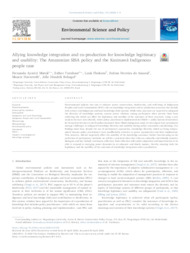Allying knowledge integration and co-production for knowledge legitimacy and usability: The Amazonian SISA policy and the Kaxinawá Indigenous people case.
Allying knowledge integration and co-production for knowledge legitimacy and usability: The Amazonian SISA policy and the Kaxinawá Indigenous people case.
Autoria: MATUK, F. A.; TURNHOUT, E.; FLESKENS, L.; AMARAL, E. F. do; HAVERROTH, M.; BEHAGEL, J. H.
Resumo: Environmental policies that aim to enhance nature conservation, biodiversity, and well-being of Indigenous Peoples and Local Communities (IPLC) rely on knowledge integration and co-production processes that include both science and Indigenous and local knowledge (ILK) systems. While these processes are expected to safeguard the diversity of knowledge systems, uneven power relations among participants often prevent them from achieving this which can affect the legitimacy and usability of the outcomes of these processes. Using a case study in the Acre state (Brazil), where policy practitioners implemented the REDD+policy System of Incentives for Ecosystem Services in the Brazilian Kaxinawá Nova Olinda Indigenous Land, we investigate how participants manage challenges to safeguard knowledge diversity and usability during policy assessment and planning. Our findings show how, despite the use of participatory approaches, knowledge diversity ended up being compromised because policy practitioners were insufficiently attentive to power asymmetries and their implications. This, however, did not negatively affect the usability of the knowledge outcomes. Rather than focusing on the perfection of participatory methods, we call for a practical ethics that relies on culturally and ethically sensitive dialogues and that include continuous reflection. Such reflection will enable adaptation and improvisation to be able to respond to emerging power dynamics in an adequate and timely manner, thereby ensuring both the legitimacy and the usability of the outcomes of knowledge integration and co-production.
Ano de publicação: 2020
Tipo de publicação: Artigo de periódico
Unidade: Embrapa Acre
Palavras-chave: Acre, Amazonia Occidental, Amazônia Ocidental, Conhecimento tradicional, Ecosystem services, Environmental policy, Feijó (AC), Gestão participativa, Indigenous knowledge, Indigenous peoples, Método participativo, Participative management, Planejamento Participativo, Povos indígenas, Pueblos indigenas, REDD+, SISA, Servicios ecosistémicos, Serviços ecossistêmicos, Terra Indígena Kaxinawá de Nova Olinda (TIKNO), Western Amazon
Observações
1 - Por padrão são exibidas publicações dos últimos 20 anos. Para encontrar publicações mais antigas, configure o filtro ano de publicação, colocando o ano a partir do qual você deseja encontrar publicações. O filtro está na coluna da esquerda na busca acima.
2 - Para ler algumas publicações da Embrapa (apenas as que estão em formato ePub), é necessário ter, no celular ou computador, um desses softwares gratuitos. Sistemas Android: Google Play Livros; IOS: iBooks; Windows e Linux: software Calibre.
Acesse outras publicações
Acesse a Base de Dados da Pesquisa Agropecuária (BDPA) para consultar o acervo completo das bibliotecas da Embrapa.

